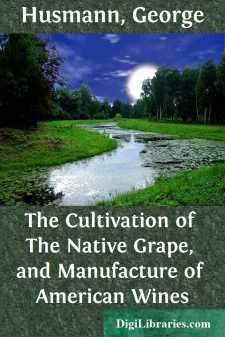Non-Classifiable
- Non-Classifiable 1768
Non-Classifiable Books
Sort by:
The Devils of Loudun Loudun is a small town in France about midway between the ancient and romantic cities of Tours and Poitiers. To-day it is an exceedingly unpretentious and an exceedingly sleepy place; but in the seventeenth century it was in vastly better estate. Then its markets, its shops, its inns, lacked not business. Its churches were thronged with worshipers. Through its narrow streets proud...
more...
INTRODUCTION No introduction to Mrs. Langloh Parker's book can be more than that superfluous 'bush' which, according to the proverb, good wine does not need. Our knowledge of the life, manners, and customary laws of many Australian tribes has, in recent years, been vastly increased by the admirable works of Mr. Howitt, and of Messrs. Spencer and Gillen. But Mrs. Parker treats of a tribe...
more...
by:
Various
WILKINS ON ACCOMPLISHMENTS. A DUOLOGUE. JOHN QUILL. Mr. Wilkins. Mrs. Wilkins, of all the aggravating women I ever came across, you are the worst. I believe you'd raise a riot in the cemetry if you were dead, you would. Don't you ever go prowling around any Quaker meeting, or you'll break it up in a plug muss. You? Why you'd put any other man's back up until he broke his...
more...
CHAPTER I THE YOUNG MOHAWK A group of huntsmen were camping on the Ohio river. The foliage swayed in the night wind, and the argent light of the moon ran in fleeting bars through the dim recesses of the forest. From the ground arose a ruddier glare. High and dry, fires had been built and the flames were darting and curvetting among the trees. In the weird light the hunters were clustered about in...
more...
by:
Charles C. Royce
CHARACTER OF THE INDIAN TITLE. The social and political relations that have existed and still continue between the Government of the United States and the several Indian tribes occupying territory within its geographical limits are, in many respects, peculiar. The unprecedentedly rapid increase and expansion of the white population of the country, bringing into action corresponding necessities for the...
more...
PREFACE In 1590 a.d. the HÃ
ÂjÃ
 were overthrown at Odawara by the TaikÃ
 Hidéyoshi, and the provinces once under their sway were intrusted to his second in command, Tokugawa Iyeyasu. This latter, on removing to the castle of Chiyoda near Edo, at first paid main attention to strengthening his position in the military sense. From his fief in TÃ
ÂtÃ
Âmi and Suruga he had...
more...
Dear Mr. President The enclosed report, The Nation's River, is submitted in response to your February 8, 1965, request that we prepare a program for your consideration which would assure that the Potomac would serve as a model of scenic and recreation values for the entire country. This is the final report of your Potomac planning team. In my opinion, the study contributes significantly to a more...
more...
THE PRICE OF A SOUL The fact that Christ dealt with this subject is proof conclusive that it is important, for He never dealt with trivial things. When Christ focused attention upon a theme it was because it was worthy of consideration—and Christ weighed the soul. He presented the subject, too, with surpassing force; no one will ever add emphasis to what He said. He understood the value of the...
more...
by:
George Husmann
INTRODUCTION It is with a great deal of hesitation I undertake to write a book about Grapes, a subject which has been, and still is, elucidated every day; and about which we have already several works, which no doubt are more learned, more elaborate, than anything I may produce. But the subject is of such vast importance, and the area suitable for grape culture so large, the diversity of soil and...
more...
by:
James MacQueen
Startling as the subject of connecting China and New South Wales with Great Britain, through the West Indies, may at first sight appear, both as regards time and expense, still few things are more practicable. The labour and expense of crossing the Isthmus of America, either by Panama or by Lake Nicaragua, by a land conveyance, is trifling. With eight steam-boats, ONLY FOUR ADDITIONAL to the number...
more...











